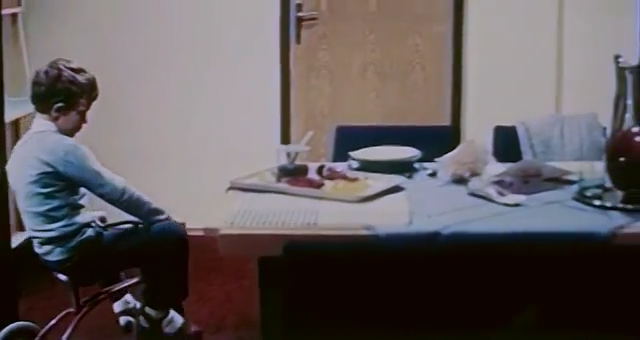Slnko v sieti [The Sun in a Net] (Štefan Uher, 1963)
May
9
lunch

An old man, enclosed in a simple, wooden window frame, eating his lunch. DP: Stanislav Szomolányi.
czechoslovakia
Touha zvaná Anada [Desire Called Anad / Adrift] (Elmar Klos + Ján Kadár, 1968/1971)
Jan
21
salt

Semi-off screen, an older man with a moustache at a dinner table – many plates, glasses, and foods – reaches for a bowl of salt. DP: Vladimír Novotný.
Ucho [The Ear] (Karel Kachyňa, 1970)
Jan
8
cake

A gold-rimmed plate with a messy piece of cake on its side. Near it two glasses and a bottle of alcohol. DP: Josef Illík.
Holubice [The White Dove] (František Vláčil, 1960)
Dec
9
Official Lost And Found Day

Michal (Karel Smyczek) finds the white dove perched on a sculpture. The artwork depicts a faceless boy. DP: Jan Čuřík.
Something is lost and found on Official Lost and Found Day (USA)
O slavnosti a hostech [A Report on the Party and Guests] (Jan Němec, 1966)
Nov
22
grapes

A man in tuxedo removes a grape seed from his mouth. He's seated at a wonderfully opulently set table in a birch forest. DP: Jaromír Šofr.
“So will someone tell me what happened or not? A brother shouldn't turn against his brother. And a guest shouldn't turn against a guest.”O slavnosti a hostech [A Report on the Party and Guests] (Jan Němec, 1966)
Nov
22
Bales' Birthday

The birthday party mingled in with the others in the woods, all dressed immaculately and seated at elaborately decked tables. The guests and their host raise their glasses towards the camera. DP: Jaromír Šofr.
A birthday party for OP Bales’ birthday!
– the host
“So where do we go from here?”O něčem jiném [Something Different] (Věra Chytilová, 1963)
Nov
3
Housewife Day

Věra (Věra Chytilová) looks out of a window. Everything is grey. DP: Jan Čuřík.
A housewife for (National) Housewife Day (USA)
In Věra Chytilová's O něčem jiném, parallel storylines, one filmed as a documentary the other as a fictional drama, of two women are shown.
– Eva
Olympic gymnast Eva (Eva Bosáková) undergoes a gruelling training regime. Housewife Věra (Věra Uzelacová) feels neglected by her husband. Both ruminate on a different life.
Vražda ing. Čerta [The Murder of Mr. Devil / Killing the Devil] (Ester Krumbachová, 1970)
Aug
18
Serendipity Day

Ona (Jiřina Bohdalová) is her wonderful kitchen, smoking two well-deserved cigars. DP: Jiří Macák.
Ester Krumbachová's feminist farce is a delight of many flavours. Ona (Jiřina Bohdalová) is already 40 and in need of a man. She remembers one from her youth, the handsome, slim, and very cultured Eng. Bohouš Čerta (litt. “God the Devil, Engineer”, played by the always great Vladimír Menšík), and knows that the one way to a man's heart is through the stomach.
Her cooking is immaculate. So are her looks and her apartment (all created by one-time director Krumbachová who worked as a costume designer and screenwriter). Unfortunately, her beau has turned boorish and stuffs his face with all but her and the furniture (is that true?). But cooking she can, and wanting she does. So she cooks and cooks and cooks up some more.
Sedmi kontinent [Sedmý kontinent / The Seventh Continent] (Dušan Vukotić, 1966)
Aug
12
teevee dinner

A little blond boy on a red tricycle driving past his TV-ish dinner in an empty house. DP: Karol Krška.
“Don't you recognise me?”Drak sa vracia [Dragon's Return / The Return of Dragon] (Eduard Grečner, 1968)
Aug
9
Smokey Bear Day

Drak (Radovan Lukavský), a Caucasian man with a rough looking face and an eyepatch over his left eye. The landscape behind him is mere blurs. DP: Vincent Rosinec.
Drak [“dragon” or “devil”] returns to his village. No one understands why he came back, or where he has been. The villagers postulate smugglers and there's other drunk nefarious thoughts, but for sure they know that with the potter, the draught returned. In an unspoken ritual sung in old tongues, the grey women summon the rain. The forest, dry as tinder, has taken the cattle, all there is. Drak knows where the animals went and a deal is struck.
– Drak
Drak sa vracia speaks in mere whispers and smoky greys. The main characters – the #fire, smoke, pottery, and composer Ilja Zeljenka's often silent motif – weave their wordless presence throughout the ancient landscape; that same landscape that carved itself into the locals' being.